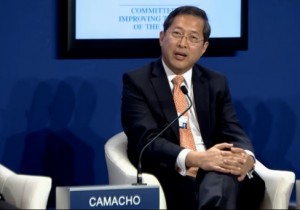MANILA, Philippines—The government should figure out ways to open up restricted industries to foreign investors without changing the Constitution, former Finance Secretary Jose Isidro “Lito” Camacho said at the sidelines of the World Economic Forum (WEF) on East Asia held in Makati this week.
According to the current vice-chairman of Credit Suisse for Asia Pacific, liberalizing protected industries such as public utilities would attract more foreign investments, the key to creating more jobs in the country.
This was possible, Camacho added, without having “to change the (Philippine) Constitution,” which states that foreigners are not allowed to own more than 40 percent of companies in such industries as power distribution, transportation, and telecommunications. Foreigners are also barred from owning any shares in media companies.
Camacho recalled a move he started, but “was unable to complete,” when he was Finance secretary that would allow foreigners to have long-term leases on real estate, without them necessarily owning the property.
Lease-holds
The former Finance official was referring to the practice of lease-holds, which is common in markets like Hong Kong.
Despite Constitutional restrictions on foreign ownership of crucial industries, several firms have found ways around them that regulators have allowed.
Globe Telecom and the Philippine Long Distance Telephone Co. (PLDT), for instance, issue non-voting preferred shares to their foreign shareholders. Globe is partly owned and controlled by Singapore’s SingTel, while PLDT is co-owned by Hong Kong’s First Pacific Co. Ltd. which is led by business tycoon Manuel V. Pangilinan, and Japanese telecom giant NTT DoCoMo.
In March this year, the House committee on constitutional amendments approved a resolution that seeks to amend economic provisions in the Constitution.
Authored by Speaker Feliciano Belmonte, the resolution would add the phrase “unless otherwise provided by law” to the Constitution’s general provisions and its articles on the national economy and patrimony; education, science, technology, arts, culture and sports.
The resolution would not however automatically remove limits on foreign ownership and participation as stipulated in the Charter. Congress is still expected to pass laws to lift the restrictions, and lawmakers may do this for constitutional provisions that prevent foreigners from operating public utilities and educational institutions, and from undertaking activities to develop the country’s natural resources.
RELATED STORIES
Gov’t urged to focus on sustaining reforms
Aquino spotlights ordinary Filipinos at World Economic Forum
Gov’t explores new ways to ensure food security
